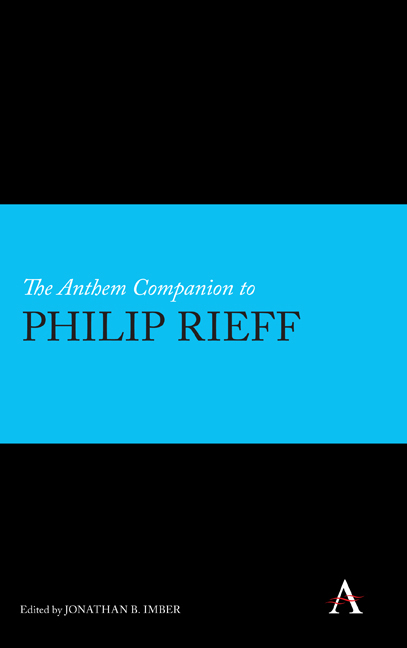Book contents
- Frontmatter
- Contents
- Introduction
- Chapter 1 Philip Rieff: Some Reflections
- Chapter 2 Philip Rieff and the Impossible Culture
- Chapter 3 Philip Rieff as Cultural Critic
- Chapter 4 Philip Rieff as Teacher
- Chapter 5 Prophet v. Stoic: Philip Rieff's Case against Freud
- Chapter 6 Decline and Fall in the Work of Philip Rieff: “I love the old questions” Beckett, Endgame
- Chapter 7 Philip Rieff as Social/ Cultural Theorist
- Chapter 8 Fellow Sons
- Chapter 9 Philip Rieff and Social Theory
- Chapter 10 A Kindly Apocalypse: Philip Rieff and the Endgame of the Therapeutic
- Chapter 11 Disenchantment, Authenticity and Ordinary Charisma
- Writings of Philip Rieff
- List of Contributors
- Index
Chapter 5 - Prophet v. Stoic: Philip Rieff's Case against Freud
Published online by Cambridge University Press: 21 June 2018
- Frontmatter
- Contents
- Introduction
- Chapter 1 Philip Rieff: Some Reflections
- Chapter 2 Philip Rieff and the Impossible Culture
- Chapter 3 Philip Rieff as Cultural Critic
- Chapter 4 Philip Rieff as Teacher
- Chapter 5 Prophet v. Stoic: Philip Rieff's Case against Freud
- Chapter 6 Decline and Fall in the Work of Philip Rieff: “I love the old questions” Beckett, Endgame
- Chapter 7 Philip Rieff as Social/ Cultural Theorist
- Chapter 8 Fellow Sons
- Chapter 9 Philip Rieff and Social Theory
- Chapter 10 A Kindly Apocalypse: Philip Rieff and the Endgame of the Therapeutic
- Chapter 11 Disenchantment, Authenticity and Ordinary Charisma
- Writings of Philip Rieff
- List of Contributors
- Index
Summary
In one of Philip Rieff's earliest publications (January 1950), an otherwise forgettable review of a book on Proudhon by Jesuit scholar Henri de Lubac, Rieff briefly raises the question of why one intellectual chooses to “take up” the work of another and puts forward the following answer: “[T] o take up a man is to have him serve one's own purposes” (Rieff 1950, reprinted in Imber 1990, 167). Such an observation may not be particularly novel or profound, but the fact that Rieff makes it precisely at the time when he was first “taking up” Freud— the principal cultural figure with whom he was to grapple for the remainder of his life— suggests that it may be worthwhile asking the same question of Philip Rieff. Why did he decide to “take up” Freud when he did? What “purposes” did his long engagement with Freud serve? To what extent did these purposes help illuminate important aspects of Freud's thought and its cultural implications, but to what extent did Rieff's purposes distort or conceal them?
At first glance, to ask why Rieff decided to take up Freud in the late 1940s seems like a non- question. In the postwar cultural climate of the United States, Freud's status was at its height and particularly so at the University of Chicago, where Rieff was still a student (Menand 2012; Ross 2012; Gitre 2010). From the time of W. I. Thomas, William Ogburn and Ernest Burgess on, interest in psychoanalysis within the social sciences at Chicago was high and remained so throughout the 1930s and 1940s with the arrival of Franz Alexander in 1930 and the presence of such figures as Edward Shils, David Riesman and Harold Lasswell. In such an environment, not to engage seriously with Freud's thought would have been surprising. Nevertheless, there is little evidence of Rieff's interest in, and study of, Freud's thought prior to 1949.
- Type
- Chapter
- Information
- The Anthem Companion to Philip Rieff , pp. 77 - 98Publisher: Anthem PressPrint publication year: 2018

